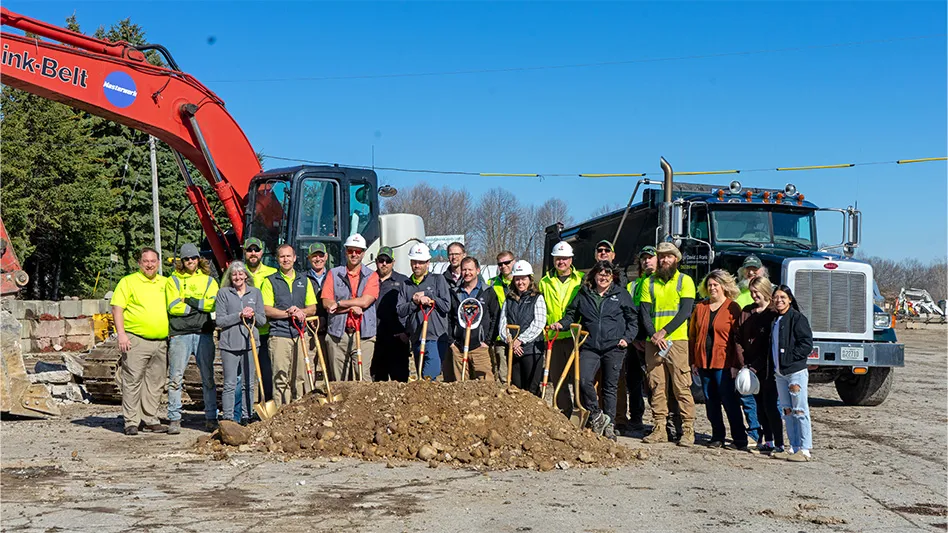
The coronavirus pandemic has caused plenty to change. From the way business is done, to people working remotely, 2020 has brought along all sorts of obstacles. Attendees of SiteOne Landscape Supply’s annual Women in the Green Industry (WIGI) event learned how to cope with these challenges and lead through them.
WIGI was held virtually on Friday, Oct. 2, this year and featured four presentations on a variety of topics along with supplier-partner exhibits and live chats.
CHANGING THE WAY YOU MAKE CHANGES. The keynote was delivered by Dr. Michelle Rozen and titled “Leading Forward through Change with Confidence.”
Rozen shared personal stories from her own life about making changes and empowering yourself to stick with those changes.
Rozen, who has a PhD in psychology, gave an analogy of a person waiting for the elevator and hitting the button multiple times while waiting for the elevator to arrive.
“Why does are mind cause us to do things that don’t make any sense, just to get the same result?” she asked.

Dr. Michelle Rozen
In order to adopt new behaviors and make an effective change, Rozen pointed out that a person is working against their own brain, which wants to remain in its “default setting.” Due to the coronavirus pandemic and the state of the world, Rozen said being able to lead through change is more important now than ever.
Rozen then shared five steps with attendees so they could lead more effectively through these difficult times.
She said the first step is to empower yourself and those around you.
“Be present and give people your undivided attention,” Rozen said.
According to Rozen the second step is a critical one – focus.
“We spend major time on minor things,” she said.
Rozen suggested that attendees learn to utilize her 0-10 Rule to rate all tasks and goals. She said to focus to focus on the 10s first and ignore anything that was under a 6.
Step three from Rozen was overcoming mind biases. She advised the group to block out criticism that is inevitable when making changes.
Rozen said step four is to adhere to the 20 Minute Rule and take a short break from a task that is causing stress and come back to it later when you’re refreshed.
“Wait it out like a pot on a hot stove,” Rozen said. “When you come back it will be cooler and you won’t burn your hands.”
And Rozen’s fifth step was simple – believe in yourself.
Following her keynote, Rozen also held a workshop where attendees were able to share goals they had, and how they would achieve them, with her and she gave them encouragement and guidance.
H-2B KNOW-HOW. WIGI also included a presentation on the H-2B process by Scott Patterson, a shareholder with Detroit-based law firm Butzel Long.
Patterson discussed the legal requirements and considerations for seeking H-2B visa labor, along with the timing, costs, certifications and other aspects of the process.
Patterson said that while some attendees may have been hiring H-2B labor for years, it’s important to review your process regularly.
“You don’t want to just copy and paste what you did last year,” he said.
Patterson shared that annually there are 133,000 workers entering the country on H-2B visas and about 70% are from Mexico.
“The landscaping and lawn service industries are huge users of H-2B labor,” Patterson said.
Because of the high demand, Patterson suggested starting the process early as it usually takes around 120 days.
Patterson also said there a few changes this year to keep in mind, including new filing fees and no longer having to post a newspaper ad for the job beforehand.
One of the new fees is the $1,440 premium processing fee. While premium processing is optional Patterson said anyone who wants to be in contention should pay it.
“Premium processing has essentially become regular processing, so assume you’ll have to pay the fee,” he said.
Patterson also touched on what COVID-19 has done to the H-2B process and what the year ahead could hold. Earlier this summer, President Trump halted H-2B visas until Dec. 31, 2020.
“What is going to happen in 2021 is still unknown,” Patterson said “They’re still processing applications. We will all have to wait and see.”
CELEBRATING WOMEN IN GREEN. Next on the agenda was a panel titled “A Forward Focus: Recruiting, Retaining and Empowering Women in the Landscape Industry” with members of NALP’s Women in Landscape Network.
The discussion was moderated by NALP’s Jenn Myers and also included Brigitte Orrick, with The Davey Tree Expert Company; H. Jaclyn Ishimaru-Gachina, with Gachina Landscape Management; and Jennifer Lemcke, with Weed Man.
The women touched on a variety of topics including maternity leave and pregnancy, promotion and advancement in the workplace, mentorship, inclusion and creating a work/life balance.
Recently, Ishimaru-Gachina noted Gachina Landscape has been promoting women in the industry on social media as a way to attract more women to her company.
Orrick and Lemcke said their companies have been working to get better fitting uniforms, safety gear and tools for female employees along with having appropriate restroom facilities available for them near jobsites.
“We identified important things that women have to have to be successful,” Orrick said.
Lemcke added that women becoming more involved in the industry has been a natural progression at Weed Man with many women owning franchises.
Ishimaru-Gachina said that while hiring women is essential – it’s not enough.
“It’s not important to just hire them but we need to promote them to be decision makers,” she said. “We need to give them the opportunity to affect change.”
Lemcke and Orrick said their companies are mapping long-term job plans, that could include executive roles, for employees regardless of gender.
The group also discussed how working from home in the midst of the pandemic can affect attendees’ work/life balances.
Lemcke shared that finding a balance has always been a struggle for her, and she accepts that most times the scale will be uneven.
“It’s very had to have balance,” she said. “It just doesn’t always balance out.”
Orrick agreed and said that the most important thing to do is recognize that everyone is in the same boat and take it easy on yourself and others.
“Just give yourself grace,” Orrick said.
Latest from Lawn & Landscape
- Volvo Construction Equipment upgrades 2 mid-size wheel loaders
- Mean Green introduces its largest electric zero-turn mower
- Landscape Workshop acquires Cut Above Enterprises
- Scythe debuts new generation of M.52
- New identities
- Ruppert promotes Anderson to director of talent acquisition
- Fleet on the Street
- Man in the mirror





